The 10 Most High-Tech Cancer Hospitals in America
Written by Karen Selby, RN • Edited By Walter Pacheco
Asbestos.com is the nation’s most trusted mesothelioma resource
The Mesothelioma Center at Asbestos.com has provided patients and their loved ones the most updated and reliable information on mesothelioma and asbestos exposure since 2006.
Our team of Patient Advocates includes a medical doctor, a registered nurse, health services administrators, veterans, VA-accredited Claims Agents, an oncology patient navigator and hospice care expert. Their combined expertise means we help any mesothelioma patient or loved one through every step of their cancer journey.
More than 30 contributors, including mesothelioma doctors, survivors, health care professionals and other experts, have peer-reviewed our website and written unique research-driven articles to ensure you get the highest-quality medical and health information.
About The Mesothelioma Center at Asbestos.com
- Assisting mesothelioma patients and their loved ones since 2006.
- Helps more than 50% of mesothelioma patients diagnosed annually in the U.S.
- A+ rating from the Better Business Bureau.
- 5-star reviewed mesothelioma and support organization.
Testimonials
My family has only the highest compliment for the assistance and support that we received from The Mesothelioma Center. This is a staff of compassionate and knowledgeable individuals who respect what your family is experiencing and who go the extra mile to make an unfortunate diagnosis less stressful. Information and assistance were provided by The Mesothelioma Center at no cost to our family.LashawnMesothelioma patient’s daughter
How to Cite Asbestos.com’s Article
APA
Selby, K. (2024, February 2). The 10 Most High-Tech Cancer Hospitals in America. Asbestos.com. Retrieved April 24, 2024, from https://www.asbestos.com/treatment/cancer-centers/high-tech-centers/
MLA
Selby, Karen. "The 10 Most High-Tech Cancer Hospitals in America." Asbestos.com, 2 Feb 2024, https://www.asbestos.com/treatment/cancer-centers/high-tech-centers/.
Chicago
Selby, Karen. "The 10 Most High-Tech Cancer Hospitals in America." Asbestos.com. Last modified February 2, 2024. https://www.asbestos.com/treatment/cancer-centers/high-tech-centers/.
Medical advancements are critical to improving the lives of people around the world. As is true in so many areas of our lives, technology plays an important role in improving the quality, accuracy and efficacy of modern health care. Especially when it comes to addressing the dangers of cancer.
We reviewed the nation’s top-ranked hospitals. We included those leading with innovative technology and cutting-edge research.
The 10 Best High-Tech Cancer Hospitals
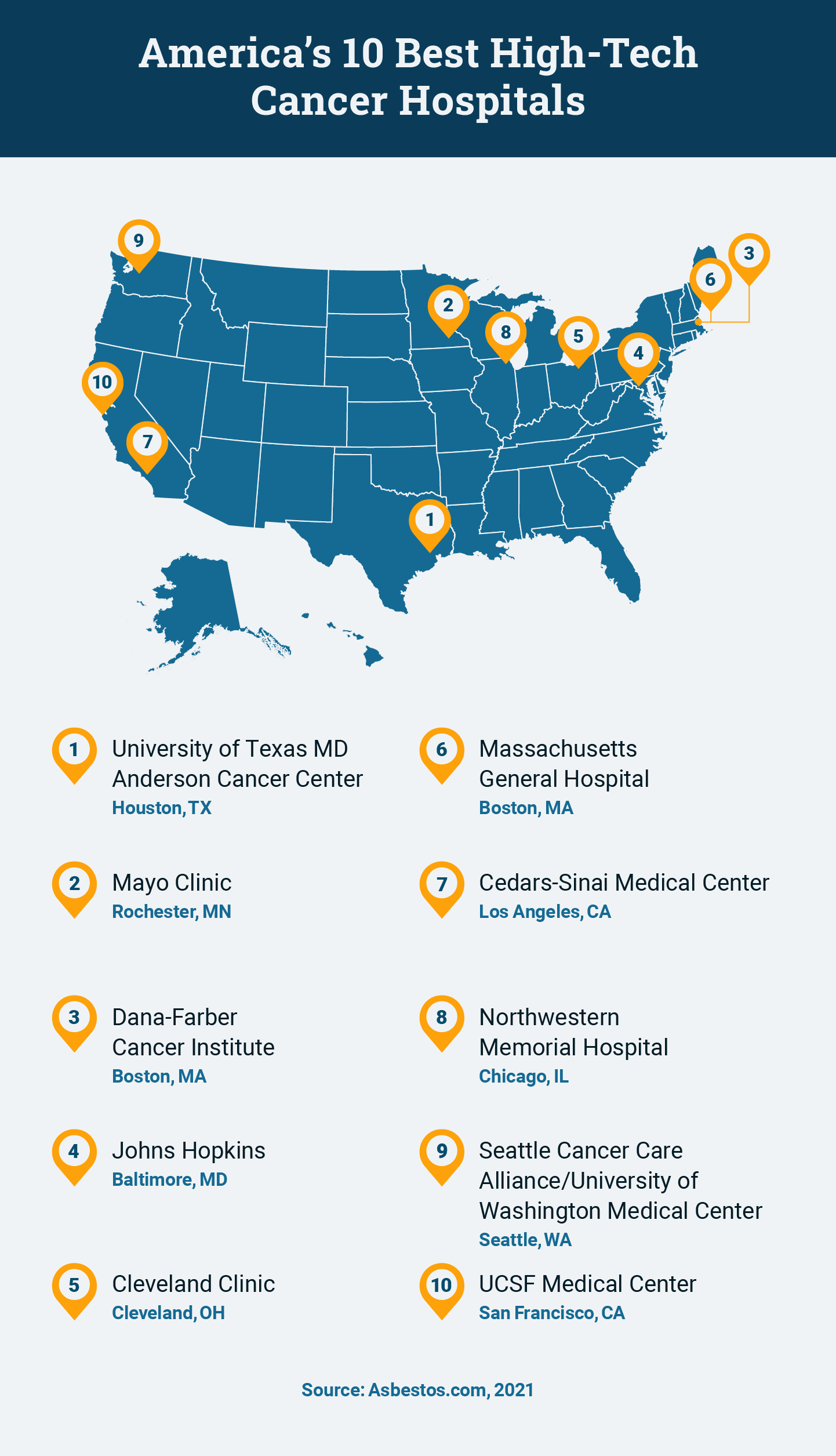
Methodology
Our researchers began with U.S. News & World Report’s rankings of the 2021 Best Hospitals for Cancer. We analyzed the scores of the top 50 cancer hospitals. We then reviewed the Newsweek ranking for each of those hospitals. As well as certification in digital health. The College of Healthcare Information Management Executives (CHIME) offers it.
We based our findings on these rankings and data points from trusted sources. They are indicators of premium patient care, innovation and advancements in cutting-edge research:
- Rank in U.S. News & World Report’s 2021 Best Hospitals for Cancer
- With special focus on scoring in three categories:
- Advanced Technologies
- National Cancer Institute rating
- Expert Opinion
- With special focus on scoring in three categories:
- Rank in Newsweek’s World’s Best Specialized Hospitals 2021 – Oncology
- Certification level in CHIME’s 2020 “Digital Health Most Wired” survey
Here’s a look at the hospitals leading the way into the future through technology and innovation.
1. University of Texas MD Anderson Cancer Center

With over 19,000 employees focused solely on cancer care, the MD Anderson Cancer Center in Houston, Texas, is a leader in the use and innovation of health technology. As a teaching hospital with one of the largest cancer prevention programs in the country, the center is known and respected for its quick translation of scientific research into improved cancer therapies and prevention methods.
MD Anderson is home to the Innovation Center, where creative thinkers across a multitude of disciplines work with researchers, clinicians and patients to design and create digital health technology products and services to improve cancer care and prevention. Other tech-based programs include the MD Anderson Oncology Expert Advisor — a decision support platform powered by cognitive computing and the Institute for Personalized Cancer Therapy — which provides detailed analysis of patient information for more precise care and cutting-edge clinical trials.
Website: www.mdanderson.org
2. Mayo Clinic
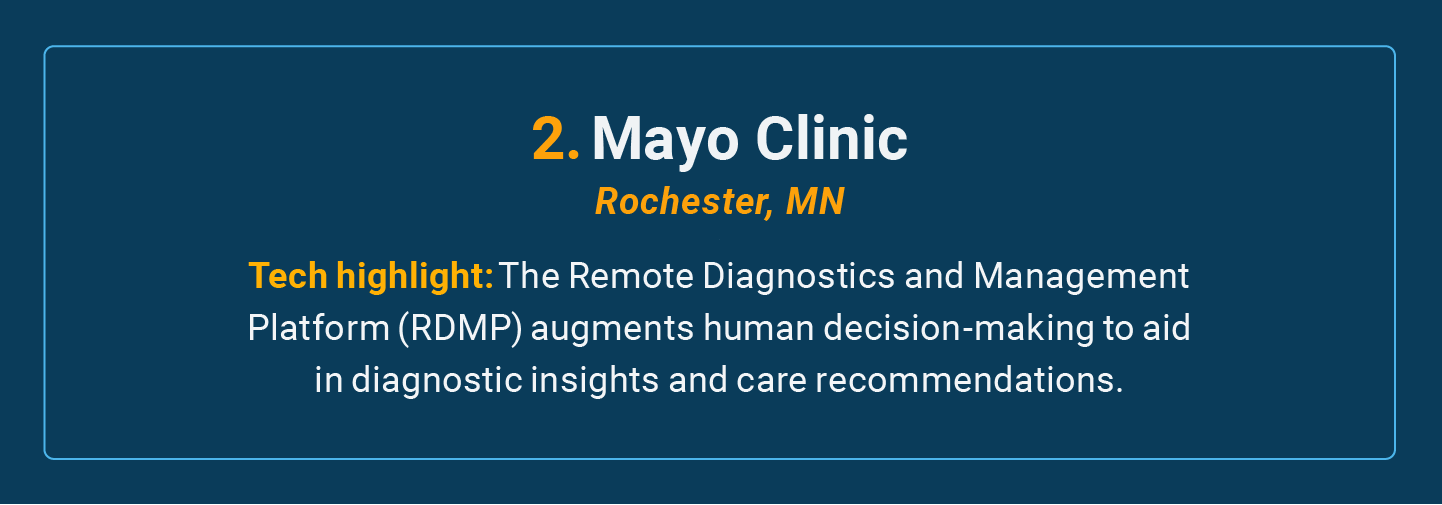
The Mayo Clinic Cancer Center treats over 100,000 cancer patients each year at its original and largest campus in Rochester, Minnesota. As a world-famous teaching hospital, the Mayo Clinic pioneered the use of electronic health records to improve patient care and research.
With a broad spectrum of medical research, scientists at the Mayo Clinic discovered the critical research behind proton beam therapy, which allows radiation oncologists to target and destroy cancer cells while sparing healthy tissue. The newest innovation from the Mayo Clinic is a technology platform that augments human decision-making within existing clinical workflows to aid in diagnostics and care. It’s known as the Remote Diagnostics and Management Platform (RDMP).
Website: www.mayoclinic.org
3. Dana-Farber Cancer Institute

Part of a collaboration with the Harvard Cancer Center, the Dana-Farber Cancer Institute was established in 1947 by the father of modern chemotherapy, Dr. Sidney Farber. Striving to train future clinical and scientific leaders in cancer care, the institute balances its focus on both compassionate patient care and advancing the understanding of the underlying causes of cancer. The Dana-Farber/Boston Children’s Cancer and Blood Disorders Center was also named the No. 2 pediatric cancer program in the country by U.S. News & World Report.
The institute’s current areas of research include lung cancer, breast cancer, skin cancer, stem cell transplants and cancer clinical trials, with specific innovative projects featuring advanced technology in the forms of a human antibody engineering platform and lung cancer gene alterations.
Website: www.dana-farber.org
4. Johns Hopkins

For almost 50 years the Sidney Kimmel Comprehensive Cancer Center at Johns Hopkins has been at the forefront of improving the scientific understanding of the mechanisms of cancer and developing new methods of treatment.
Recent tech successes at Johns Hopkins include the creation of the award-winning Coronavirus Resource Center, which aggregates and analyzes data on COVID-19 cases, testing and contact tracing in real-time to assist health care professionals, policymakers and the worldwide public to respond to the pandemic. Researchers from Johns Hopkins have also recently developed a revolutionary new software that can shrink the processing time for profiling gene mutations in DNA — such as cancer — from 15 days to three days.
Website: www.hopkinsmedicine.org
5. Cleveland Clinic

Cleveland Clinic, celebrating its centennial year, recently announced a 10-year partnership with technology giant IBM to create the Discovery Accelerator. The goal is to combine AI, cloud and quantum computing capabilities with research efforts to advance health care innovation.
The hospital also hosts the annual Medical Innovation Summit, organized by Cleveland Clinic Innovations, the development arm of the medical institution. New research on the use of PARP inhibitors in the treatment of prostate cancer was recognized as one of the organization’s Top 10 Medical Innovations for 2021.
Website: my.clevelandclinic.org
6. Massachusetts General Hospital
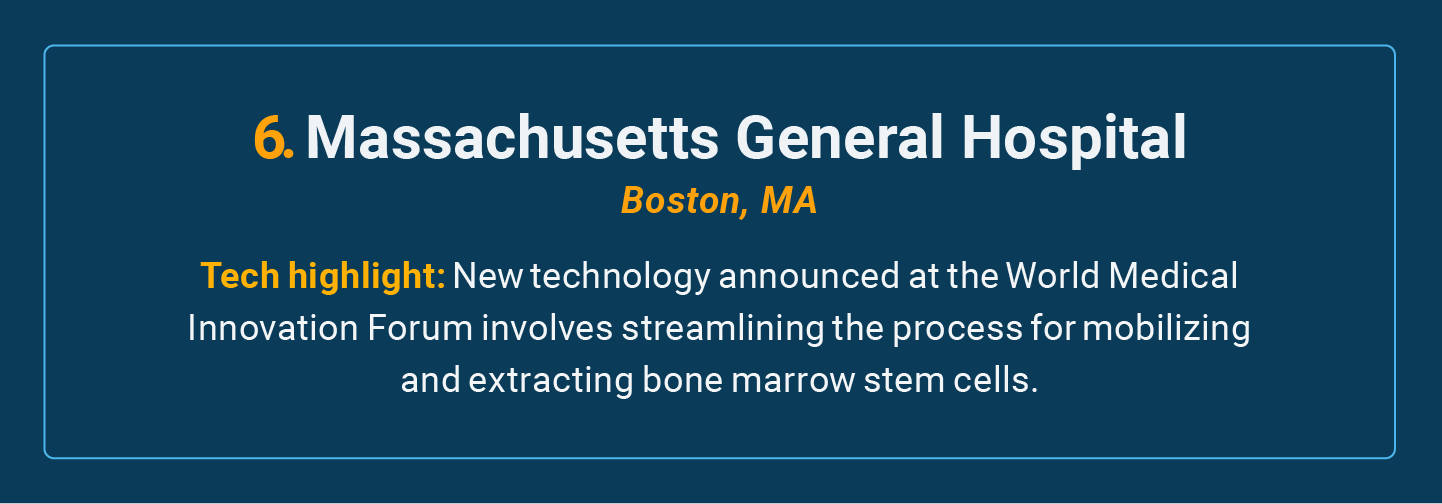
Mass General Brigham, a teaching hospital for Harvard Medical School that was founded in 1811, features America’s largest hospital-based research program. The institution is one of the founding members of the Consortia for Improving Medicine with Innovation and Technology.
One recent success in digital health-enabled technology from Mass General, announced as part of a list called the Disruptive Dozen at the World Medical Innovation Forum, involves streamlining the process for mobilizing and extracting bone marrow stem cells.
Website: www.massgeneralbrigham.org
7. Cedars-Sinai Medical Center

Oncology experts at Cedars-Sinai Medical Center treat more than 60 types of cancer. It is the largest single cancer-care provider in California. The medical center is home to multiple cancer research programs, including the Determinants of Liver Metastasis Program, the only one of its kind in the country to concentrate on the causes and potential treatment of liver metastasis from cancers of the prostate, pancreas and colon.
A recent pilot program at Cedars-Sinai brought the world’s first patient-centered voice assistant platform, known as Aiva, into patient rooms. The Alexa-powered platform was developed as part of the Cedars-Sinai Accelerator and allows patients hands-free interactions with nurses.
Website: www.cedars-sinai.org
8. Northwestern Memorial Hospital
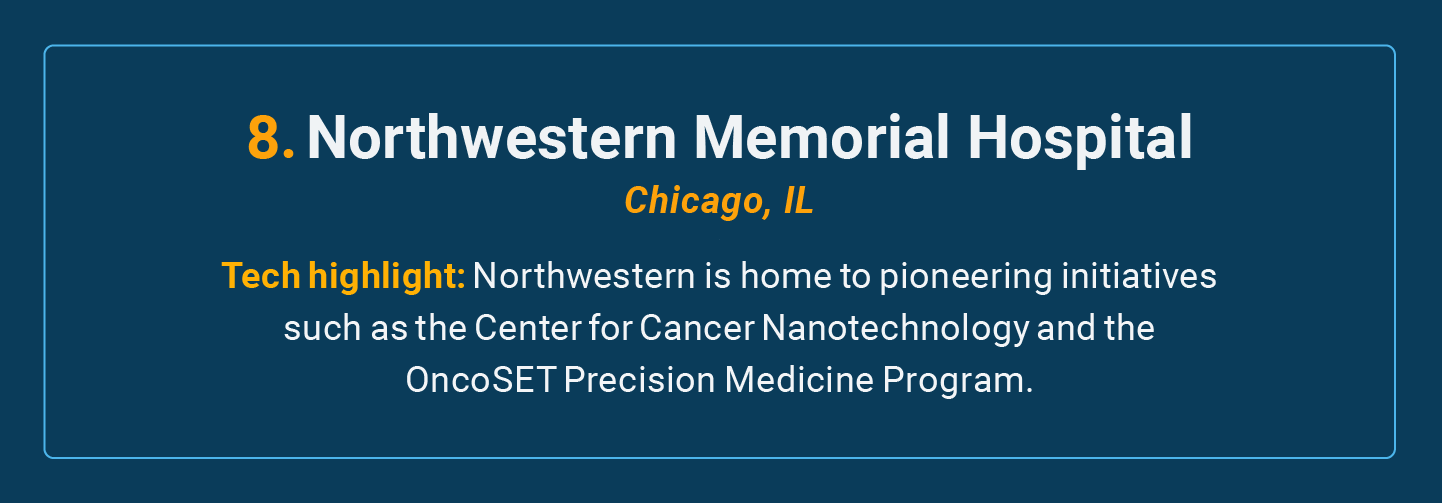
Northwestern Memorial Hospital, the teaching hospital for Northwestern University Feinberg School of Medicine, is home to the Robert H. Lurie Comprehensive Cancer Center. The hospital features pioneering initiatives such as the Center for Cancer Nanotechnology Excellence and the OncoSET Precision Medicine Program, which uses genomic technologies to identify effective personalized cancer therapies.
Northwestern is the first hospital in the United States to use new AI-enhanced ultrasound technology known as Caption AI in its cardio-oncology department.
Website: www.nm.org
9. Seattle Cancer Care Alliance/University of Washington Medical Center
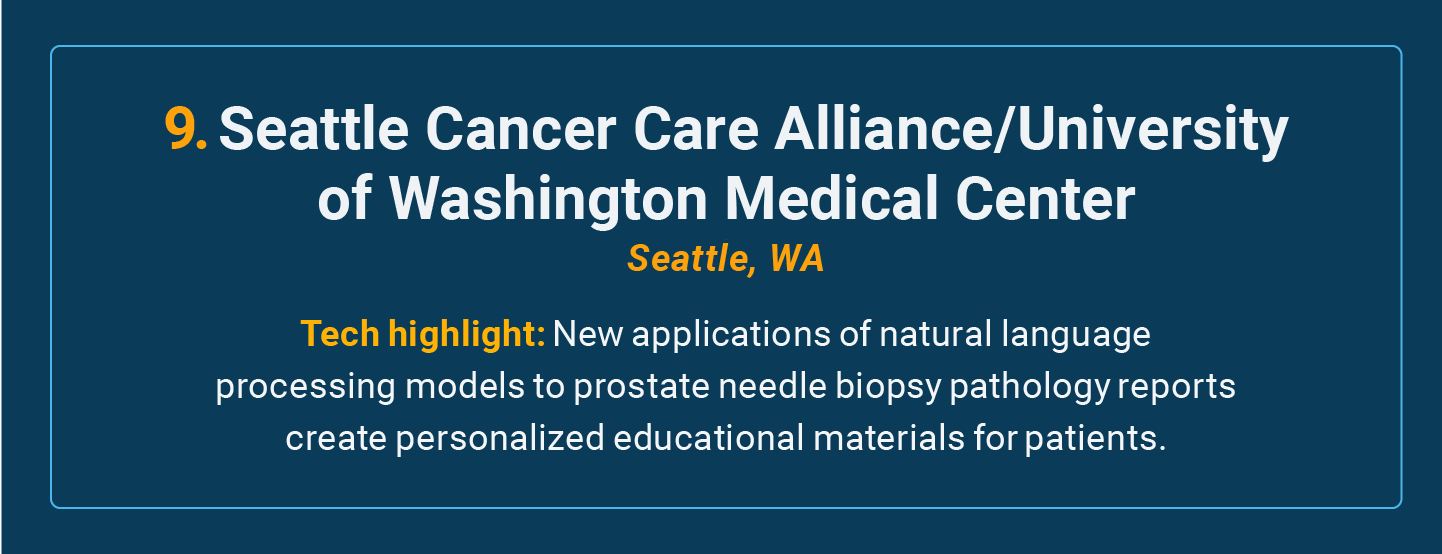
Seattle Cancer Care Alliance and the University of Washington Medical Center are members of a cancer consortium that includes the Fred Hutchinson Cancer Research Center and Seattle Children’s Hospital.
Current research combining medicine and technology being conducted at SCCA includes a project applying natural language processing models to prostate needle biopsy pathology reports to create personalized educational materials for patients.
Website: www.seattlecca.org
10. UCSF Medical Center
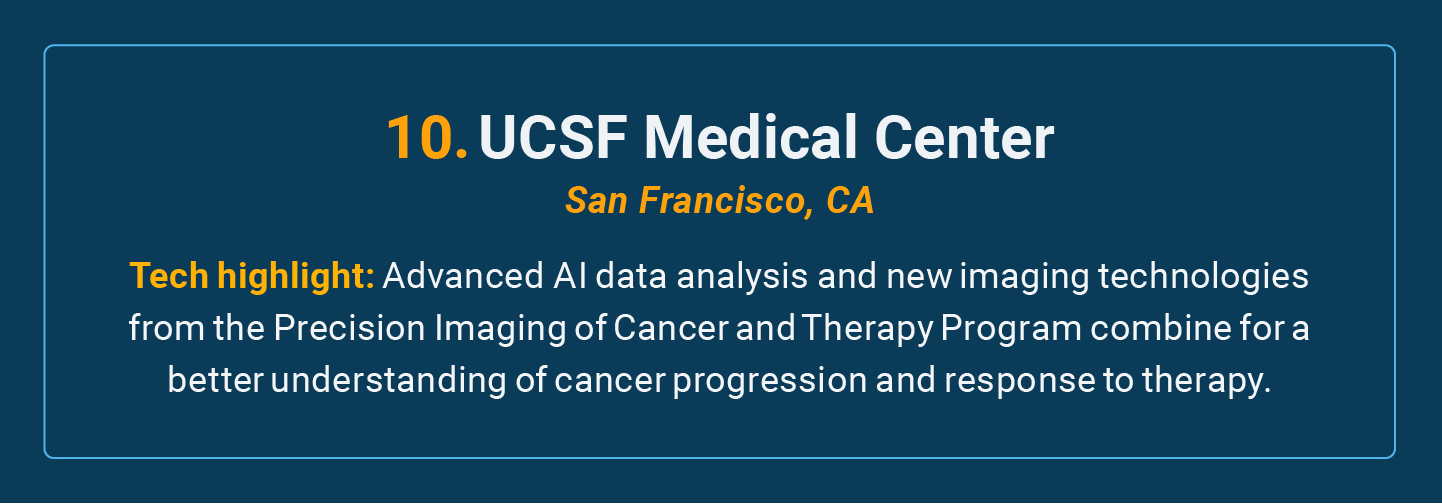
Based in a newly built state-of-the-art facility at the University of California, San Francisco, the Helen Diller Family Comprehensive Cancer Center uses the pillars of precision medicine and precision population health to guide its innovative research, treatments and patient care strategies.
The Precision Imaging of Cancer and Therapy Program at UCSF combines advanced AI data analysis methods and novel imaging technologies to better understand and document cancer progression and response to therapy.
Website: www.ucsfhealth.org
How Technology Improves Cancer Diagnosis and Care
The pace of improvements in medicine can be frustratingly slow, leading some people to avoid seeing a doctor altogether. For example, according to Dr. Bruce Gewertz, surgeon in chief at seventh-ranked Cedars-Sinai Medical Center in Los Angeles, “On average, it takes 12 years for a new drug to make it from the laboratory to the medicine cabinet, undergoing numerous rounds of preclinical testing and the prescriptive clinical trials.” Leveraging the resources — both physical and intellectual — at academic medical centers allows for nurturing new ideas and safely introducing innovative technology, treatments and care.
The application of technology in cancer prevention, diagnosis, treatment and patient care provides benefits on many levels. Artificial intelligence increases the accuracy of reading test results by better detecting precancerous lesions and saving lives, as achieved by the National Cancer Institute. Clinical trials for new medications or treatment plans involve complex data management and decision-based protocols that can be streamlined with software such as IBM’s Watson.
Technology alone is not the answer to ending cancer. Blending technological advancements in health care with the dedicated and trained medical professionals leading the fight against cancer continuously creates new hope.
When faced with a cancer diagnosis, it’s important to advocate for yourself and to identify the best health care facilities so you receive optimal care and treatment. Take the time to explore this list and the visual below to understand the best locations and newest treatments for the fight against cancer.








